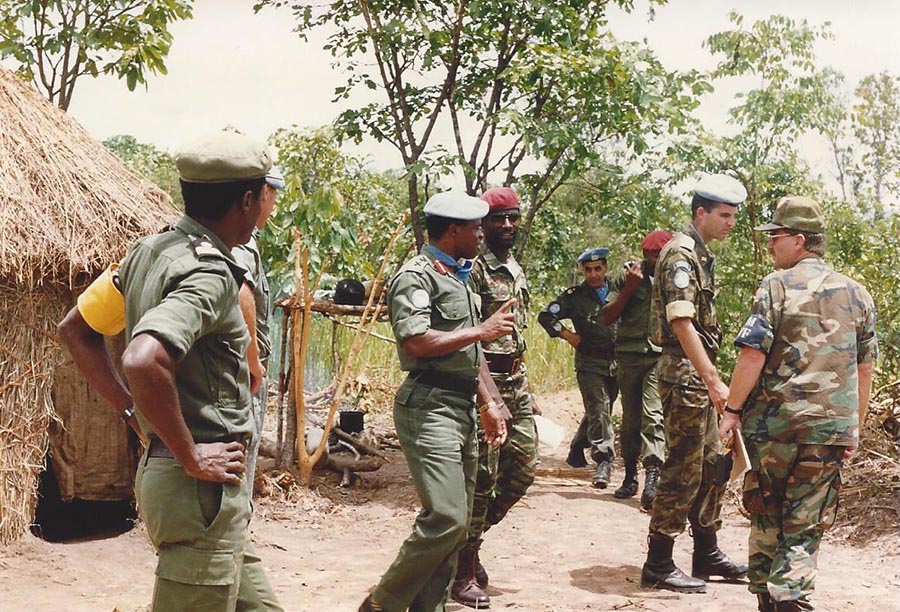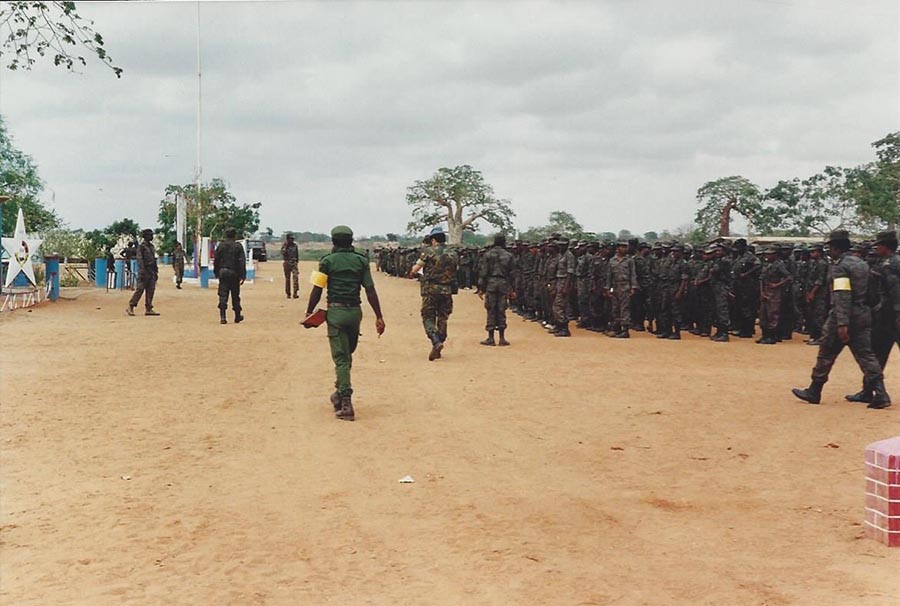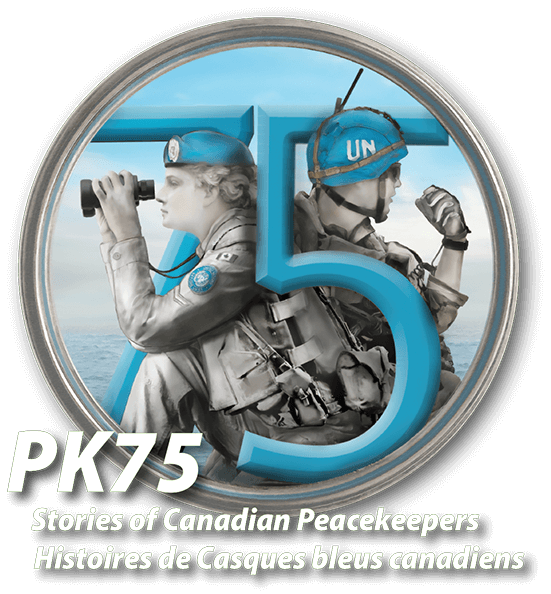

Canadian participation in UNAVEM II (United Nations Angola Verification Mission II) or Op PASTEL commenced on 17 June 1991, when 15 Canadian Officers met in Ottawa for a week in preparation for a one-year deployment to Angola as unarmed UN observers. The week was primarily spent on administrative preparations. The Foreign Affairs briefer advised us they were pleased we were going to Angola, since at that time UNAVEM was the only UN mission in which Canada had not participated. This did not go over with us. Simply put, we were being deployed for a check in the box and a political speaking point.
The Angolan Civil War began in 1975 after independence from Portugal. It was a power struggle between former anti-colonial guerrilla movements. The communist People's Movement for the Liberation of Angola (MPLA) was an urban-based movement from the Luanda region largely composed of Mbundu people, while the anti-communist National Union for the Total Independence of Angola (UNITA) was composed of Ovimbundu people from the Central highlands. A third movement, the National Front for the Liberation of Angola (FNLA), having fought the MPLA with UNITA during the Angolan War of Independence, played almost no role in the Civil War. The Angolan Civil War was a Cold War proxy conflict as Russia and the United States, with their respective allies Cuba and South Africa, assisted the MPLA and UNITA.
On 29 June 1991, myself, Ron Carson, a Strathcona, Peter Williams, a Gunner, and Pierre Rivest, a Van Doo arrived in Luanda. We stayed in downtown Luanda about 15 km from the UN Headquarters. The hotel did not have working elevators and the water was intermittent to put it mildly. Don’t even think about room service. The working language was Portuguese which we had all started learning using a distributed learning package consisting of cassettes and a study manual. We quickly realized that we were on our own and started to explore the local area to find a place to eat. We did not have transport and eventually found restaurants within 2 hours walking distance.
On 10 July, I was transferred to Lobito for two months, before finally deploying, on 4 September, to a UNITA Assembly Area called Chingongo about 120 kms inland. I was in charge of a five-man team responsible for monitoring the Assembly Area, counting troops every Wednesday, and weapons on Saturday, ensuring that weapons were secured and guarded, and investigating any violations of the UNAVEM Accord. The counting of troops was done on Wednesday across the country since both sides accused the other of moving in and out of the Assembly Areas. The troop count in Chingongo ranged from 561 for our first count on 28 September to 960 on 23 October. The counting and storage of weapons was another issue. Our first weapon count was 592 AK47s, a number of Light MGs, 60mm, 81mm and 82 mm Mortars with 200 60 mm mortar rounds, 60 for 81 and 82 mm mortars, 9 anti-tank mines and approximately 100,000 rounds of small arms ammunition. A couple of weeks later UNITA gave us a gym bag which contained a mix of explosives and detonators. From memory, it had at least 20 detonators with 8 to 10 kg of explosives and a charge for blowing railway tracks. We soon had a new grass hut built so that we could ensure separation between the ammo and explosives.
In December I was transferred to Funda, which was an MPLA training area about 30 km from Luanda. There were four MPLA Brigades in the camp and the highest count they had was over 10,000. My first count was 7,503 on 4 December and 6,895 on 11 December. The 11th was an interesting day. Everyone formed up in blocks of 20 by 20 or 400 all ranks. You checked to ensure that there were no blank files and proceeded from block to block. As I went by one block the right marker had a dog beside him. The next thing I knew the dog was trying to bite my ankle. My knife was under my shirt so I could not easily access it. However, the dog was pulled off and I carried on with the count as if nothing had happened. Next week no dog on parade. I have no doubt that the dog was just trying to protect its owner, since I was different from everyone else.
Counting weapons was a challenge. Three of the brigades each had one central armoury and the weapons were in poor shape. While 101 Tank Brigade had at least 16 different weapon vaults with well maintained weapons, they also had about 40 T54s. All of them were movers except one. I used to run through the tank park every second or third day and only one never had fresh track marks in front of it. They would not let us check the tanks until the day a New Zealand Officer and his wife asked if they could observe the count. I said yes on the condition that his wife ask if she could look inside the tanks. As I hoped, they agreed, and we were able to confirm that every tank was combat loaded.
It is more than 32 years since I served in Angola. I learned a great deal on that mission. It was my first exposure as leader and member of a truly International Team from multiple nations. I came to appreciate the Canadian training and education system. I quickly realized that officers from many other countries were not as well trained, as professional, or as dedicated.
Biography
Paul began his military career as a reservist with the Algonquin Regiment in July 1970 and subsequently joined the Cameron Highlanders of Ottawa while attending Carleton University. He completed Reserve Entry Scheme Officers Phase 1 and 2 in the summer of 1975 and transferred to the Regular Force in January 1976. He served nine years with 3 PPCLI which included two tours with the United Nations Peacekeeping Force in Cyprus. He also served as Adjutant of the PPCLI Battle School Adjutant for three years. In June 1991, he was deployed to Angola as an observer on United Nations Angola Verification Mission II. On 11 February 1992, he was transferred to United Nations Military Liaison Officer Yugoslavia (UNMLOY) which was the precursor for United Nations Protection Force (UNPROFOR). UNMLOY consisted of observers from existing missions who were transferred to Yugoslavia in early 1992 prior to the arrival of UNPROFOR.
In March 1994, Paul was tasked as one of two military officers to support the Commonwealth Observer Mission to South Africa. The initial tasking was as a Liaison Officer with South African National Peacekeeping Force in Pretoria. He was subsequently transferred to Canadian Embassy in order to support the Canadian Election Observer Mission in South Africa, where was tasked as personal escort and security for Christine Stewart, Secretary of State for Latin America and South Africa. Being as observer to the first democratic elections in South Africa was an historic and rewarding tasking.
Maj Paul Hale served as Chief of Staff and Commanding Officer of the National Command Element for Op Palladium Roto from September 2003 to April 2004. He was awarded a DCDS Commendation for his work and leadership. During the mission, 396 vehicles and 154 Sea Containers of equipment and ammunition were returned to Canada. He deployed to Afghanistan as part of Op ATHENA Roto 4 from August 2005 to March 2006 where he was employed as a Staff Officer for Commander ISAF.
In June 2006, he transferred to the Reserves and joined the Royal Highland Fusiliers of Canada where he served as Deputy Commanding Officer. He subsequently joined the Lorne Scots Regiment and deployed a second time to Afghanistan as a WSE LCol from February to October 2012 on Op Attention Roto 2. He was awarded a Commander CJOC Commendation for leadership and dedication. He retired on 15 June 2014 after 41 years and 9 months of service within the Canadian Armed Forces.
He has been actively involved with the PPCLI Association since 2010, serving as Southwest Ontario Branch President, multiple positions on the National Board of Directors, and was National President from June 2017 to May 2021. Paul has been instrumental in promoting Mental Health, Suicide Awareness and Peer Support within the PPCLI Association and the veteran community.

Inspecting UNITA soldiers accommodations.

Counting at MPLA soldiers at Funda Assembly Area.


